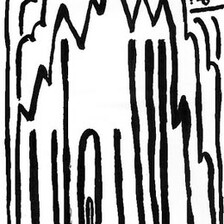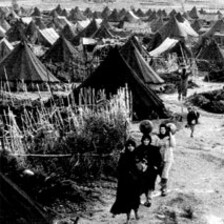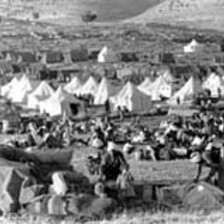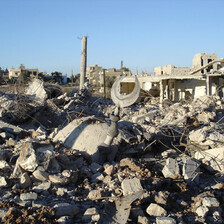Electronic Lebanon 16 July 2006
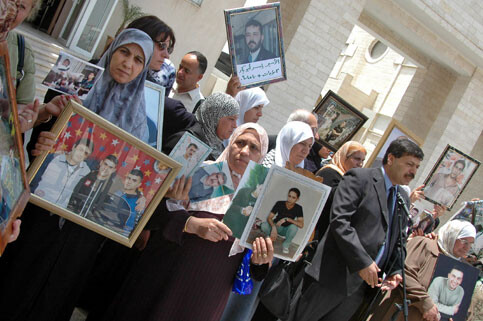
Palestinian women holding portraits of relatives in Israeli prisons, while Ziad Abu Ein, vice Palestinian Minister of Prisoners Affairs, talks to the media about their meeting with the Palestinian President Mahmoud Abbas at his headquarters in the West Bank town of Ramallah 15 July 2006. (MaanImages/Mushir Abdelrahman)
On the morning of Wednesday, 12 July 2006, members of Hizbullah penetrated the Israeli-Lebanese border, conducting a military operation that resulted in the killing of three Israeli soldiers and the abduction of two. Hizbullah demanded the release of Palestinian and Lebanese prisoners in exchange for releasing the two abducted soldiers. Since then, Israel has carried a savage military campaign against Lebanon, first under the excuse of retrieving the two soldiers, but now under the excuse of also destroying Hizbullah and making sure that it not operate against Israel, the same excuse it gave about the PLO when it invaded Lebanon in the summer of 1982. Israel’s military campaign has consisted of heavy aerial, naval, and ground bombardment of Lebanon’s infrastructure: its main and subsidiary airports, seaports, highways, bridges, communications systems, and water and power plants. It is also completely blockading its ports and entryways. The casualties are anybody’s guess, though so far news sources claim that over 140 Lebanese have been killed and hundreds more injured. Hizbullah has replied by firing Katyusha rockets, mostly against Israel’s northern settlements, with a few rockets landing in Tiberias, Haifa, Acre, and Nazareth, resulting in some Israeli civilian casualties, though by far less than the Lebanese ones.
Was Hizbullah justified in its abduction of the two Israeli soldiers? In a sense, this was an unprovoked attack (as Israeli spokespeople have been saying over and over with relish, since it is so rare that Arab attacks on Israel are indeed unprovoked): the border with Lebanon has been relatively calm, and Israel has pulled out all its troops from Lebanon in May 2000 (with the exception of the Sheb’a Farms area, which Lebanon claims as part of its territory). That the Hizbullah attack was unprovoked in this sense is a strike against its justifiability. Moreover, and as some Lebanese politicians have said, Hizbullah made this decision unilaterally, without consulting, let alone getting the approval and endorsement of, the Lebanese government. This is a problem because Hizbullah could easily have figured out the severity of the Israeli response. It was thus willing to drag the entire country of Lebanon into a difficult situation (an understatement) when it was not in a position to do so: though it has members in the Lebanese parliament and two ministers in the Lebanese cabinet, Hizbullah is not the ruling party of the country and so should not undertake such decisions on its behalf.
The second point is unassailable. Hizbullah has certainly overstepped its bounds in undertaking such an action. Indeed, not only does it not have the authority to undertake such a decision, the results of its action are by no means clear. Were we to know, if not with certainty, at least with some high degree of probability, that its action would lead to the release of some Lebanese and Palestinian prisoners, then it might be justified. But we don’t, and this casts serious doubts on its permissibility. Moreover, we have to weigh the costs with the benefits: assuming its action would secure the release of some Lebanese and Palestinian prisoners, would the cost be worth it? This we won’t know until we assess the damage of the Israeli response, a damage that might extend not just to Lebanon, but to other countries as well. This is not to hold Hizbullah responsible for Israel’s actions - that would be absurd - but to remember that part of what it is to justify actions is to weigh their consequences.
The first point, however, admits of give and take. Again, in a sense, Hizbullah’s attack was unprovoked. But we should keep in mind two points. First, Lebanon is in a state of war with Israel; there is no peace agreement between them, and Israel has no compunction about violating Lebanon’s sovereignty when it suits it do so, the most memorable event being its 1996 assault on south Lebanon (the so-called “Operations Grapes of Wrath”), not to mention its numerous breaking of the sound barrier with its violations of Lebanon’s airspace. (This issue, by the way, highlights one of Israel’s many hypocrisies: on the one hand, it considers Lebanon sovereign and that is why it held it entirely responsible for Hizbullah’s attack; on the other hand, it patronizingly claims that one of its aims in attacking Lebanon is to help Lebanon restore its sovereignty over its entire territory by helping it get rid of Hizbullah.) When two countries are in a state of war, accusations of unprovoked attacks become less clear-cut. Certainly, even if it were clear that an attack is unprovoked, this does not mean much when the two countries are in a state of war. (While being interviewed by Wolf Blitzer on CNN on 13 July, Gideon Meir, Israel’s foreign ministry spokesman, claimed that Hizbullah’s attack was a Mafia-like tactic. Blitzer, being the seasoned journalist that he is, failed to ask Meir, let alone point out to him as a fact, whether Israel has engaged in such tactics, by, say, assassinating Palestinians and arresting them without charge. After all, aren’t Palestinian prisoners the whole underlying issue here?)
But the second, and by far more important, point is that up to the time when Hizbullah abducted the two Israeli soldiers, Israel has been hammering Gaza with nasty bombardment and a siege because two weeks earlier Hamas had abducted an Israeli soldier - in an operation that cannot be described as unprovoked by any means - demanding the release of Palestinian prisoners in exchange for releasing the soldier. Of course, prior to that event, Gaza had been subject to a closure by Israel, and it and the West Bank continue to be under Israeli occupation. Israel’s prime minister, Ehud Olmert, was proceeding with a plan to unilaterally disengage from the Palestinians, by giving them a shrunken and shriveled Palestinian state in Gaza and in parts of the West Bank, with no real sovereignty and the ability to thrive. All this was happening under the not-so-watchful eye of a world that was unwilling to help. The point is that Hizbullah’s action is one of aid to the Palestinians. Because the Palestinians have been unjustly suffering for decades, with their situation getting worse and worse, it is an incumbent duty on the world to come to their aid by any means necessary and moral. The world, including the Arab one, has spectacularly failed to do so, confining itself mostly to verbal yet empty statements of support and to humanitarian aid that, though helpful, has sidestepped the core political issues of the Palestinians’ plight. If Hizbullah’s motive in abducting the two soldiers were to help the Palestinians, even if by minimally attempting to secure the release of some prisoners, then its action is, in this respect, a morally good one. Hizbullah’s action, then, admits of neither straightforward justification nor of straightforward impermissibility: in being unilateral and in having unpredictable and possible extremely high costs, it is a bad action; in being motivated by coming to the Palestinians’ aid and in having possible good benefits, it is good.
One “expert” on CNN’s barely-informative piece on the origin of Hizbullah claimed two days ago that Hizbullah was created by Iran in 1982, yet saying nothing about the fertile conditions - created by Israel’s invasion of Lebanon and the death and destruction this resulted in - that would allow a party such as Hizbullah to function and flourish.
What about Israel’s response? As a number of world leaders have pointed out, it is disproportionate. That it is disproportionate compared to the abduction of Israel’s two soldiers is clear. But is it also disproportionate compared to Hizbullah’s menace for Israel? After the dust of war settles, I can almost hear Israeli officials saying that its acquiring long-range missiles capable of reaching Haifa is solid proof that Hizbullah needed to be disarmed and its infrastructure dismantled. Indeed, Israel has been making these claims for some time. So wouldn’t this make Israel’s onslaught on Lebanon perfectly proportionate? Not quite. It is by no means clear that the damage Israel is incurring has much to do with Hizbullah or its infrastructure. Indeed, destroying Beirut International Airport and the seaports and the highways has nothing to with that. Israel’s claim that Hizbullah uses the airport to obtain weapons (like its claim that Palestinian prisoners have “blood on their hands,” as Israel’s ambassador to the US recently said in a press conference) is without a shred of evidence and even patently false to anyone remotely knowledgeable about Lebanon’s ports. Damaging the highways might hamper its current mobility, but it has nothing to do with Hizbullah’s infrastructure. Israel also operates in a world of feigned, culpable ignorance: Does it not know that brutally attacking Lebanon will only help rally the Lebanese people behind Hizbullah, as indeed seems to be happening? One “expert” on CNN’s barely-informative piece on the origin of Hizbullah claimed two days ago that Hizbullah was created by Iran in 1982, yet saying nothing about the fertile conditions - created by Israel’s invasion of Lebanon and the death and destruction this resulted in - that would allow a party such as Hizbullah to function and flourish. According to Aljazeera.net (Arabic version, Sunday, 16 July 2006), Israel, for the past 24 hours, has been bombing the southern suburb of Beirut - where many of Hizbullah’s headquarters are located but also a densely populated area - quite indiscriminately. If history is any guide, this will do little to dismantle the infrastructure of Hizbullah and much to help it gain future followers.
But the issue is not whether Israel’s response is disproportionate, important as it is. The issue is really whether Israel’s response qualifies as a last resort, another condition of a just war. While being interviewed by the local Channel 9 (WGN) television station in Chicago, the Israeli Consul asked rhetorically about Hizbullah’s abduction of two soldiers (and I am not quoting directly, as I don’t remember the exact words), “What should Israel do? Turn the other cheek?” Putting aside the implicit, though probably unintended, insult to the world’s millions of Christians who base their religion partly on this formula, the Consul apparently did not stop to think whether there could have been another option. God forbid that Israel could actually engage in mediation to secure the release of its soldier or contemplate - horror of all horrors! - the release of some Palestinian and Lebanese prisoners in exchange. Israel has a glittering image of itself and especially of its military. Many of its higher echelons seem to subscribe to the view that Arabs and Muslims understand and respect only power, and so showing “weakness” by negotiating in such a situation is out of the question. It also wants to maintain a military upper hand in the region at any cost. So negotiating would also be out of the question - not until it has taught the Lebanese a lesson they will never forget. It seems that either it has never occurred to Israel that Arabs also understand the language of justice and so it should heed their just demands, or Israel understands this very well but chooses to ignore it in pursuit of its vision of what the region should be like. Either way, Israel is culpable.
Unfortunately, the war in Lebanon will not end soon (and it has the hallmarks of a serious regional escalation, though whether this happens remains to be seen). Aljazeera.net (Arabic version) also reported today that the US has been the only country blocking an attempt by the UN Security Council to issue a resolution calling for an immediate ceasefire, claiming that it is not the time for that. The rationale here seems clear: the US wants to give time to Israel to get rid of Hizbullah, a desire that fits in perfectly with the US’s war on terror - given that it considers Hizbullah a terrorist organization - and its vision of the Middle East. So the situation is not about to end soon. Let us hope that at least we can extract out of this horror a more or less lasting and just settlement. Fouad Siniora, the levelheaded Lebanese Prime Minister, has said the truest thing so far. In an interview with CNN two days ago, he stressed that all the conflicts in the region are due to the fact that the original conflict with Israel that started in 1948 has not been resolved. We need to solve this problem, he said, and then and only then will we reach a lasting peace. How right he is. But those who have the ability to do something about this are not listening.
Related Links
Associate Professor of Philosophy at the School of the Art Institute of Chicago, Raja Halwani is currently co-authoring a book on the Palestinian-Israeli conflict
